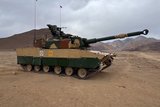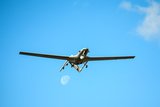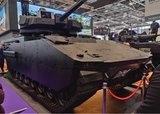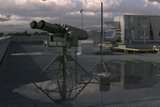DSEI 2025: Ukrainian drone aimed at British Army Watchkeeper replacement programme
The Raybird system comprises at least three UAVs alongside supporting equipment including a GCS, a catapult launcher and transport containers. (Photo: Author)
Speaking to journalists at DSEI 2025, Justin Hedges OBE, executive chairman of UK-based Prevail Partners, confirmed that Skyeton Prevail Solutions would offer the Raybird uncrewed aerial vehicle (UAV) to the UK’s Project Corvus.
As confirmed by the UK Ministry of Defence (MoD)’s Defence Equipment and Support (DE&S) organisation in April 2025, Corvus is the initiative to replace the Watchkeeper, with the MoD valuing the project at £156 million (US$206.45 million) with estimated contract award dates in May 2026 to April 2031.
Prevail Partners and the Ukrainian company Skyeton International announced their joint venture (JV) in July this year, called Skyeton Prevail Solutions, which would develop
Already have an account? Log in
Want to keep reading this article?
More from DSEI 2025
-
![Could the Ajax IFV solve the UK’s Warrior capability gap?]()
Could the Ajax IFV solve the UK’s Warrior capability gap?
With the UK facing an imminent capability gap after the retirement of its Warrior infantry fighting vehicles (IFVs), the Ajax IFV appears to be in a prime position to fill that gap.
-
![DSEI 2025: Polaris displays new all-terrain vehicle with Alakran mortar system]()
DSEI 2025: Polaris displays new all-terrain vehicle with Alakran mortar system
The Polaris Government and Defense’s Military RZR (MRZR) Alpha 1KW was displayed at the Modern Day Marine exposition in the US earlier this year and with the Alakran mobile mortar weapon system at DSEI. The company outlined recent firing trials with the Alakran mobile mortar weapon system (MMWS) which was weeks after the company announced a major NATO deal.
-
![DSEI 2025: Thales creating new remote weapon station and Storm 2 counter-drone jammer]()
DSEI 2025: Thales creating new remote weapon station and Storm 2 counter-drone jammer
Thales launched Storm-H in 2012 as an EW system equipping individual dismounted troops, and a decade later revealed details to develop the improved and more powerful Storm 2.
-
![DSEI 2025: MARSS unveils new agnostic multidomain C4 system]()
DSEI 2025: MARSS unveils new agnostic multidomain C4 system
MARSS’ NiDAR system has been deployed using sensors from static platforms to provide detection and protection for static sights, such as critical infrastructure, ports and military bases.
-
![In depth: Competition for British Army vehicle programme heats up, despite more delays]()
In depth: Competition for British Army vehicle programme heats up, despite more delays
The UK’s Land Mobility Programme (LMP) seems set to be delayed once again but industry is jockeying for position to partner in what would be one of the biggest ever buys for the British Army.
-
![DSEI 2025: UK’s new Air Chief Marshal outlines nuclear, space and IAMD as three key priorities for RAF]()
DSEI 2025: UK’s new Air Chief Marshal outlines nuclear, space and IAMD as three key priorities for RAF
Aiming to field a more integrated, agile force, the military leader said in a keynote speech that focus on these core areas would be increased to help the RAF deter and meet challenges in the new threat landscape.
























